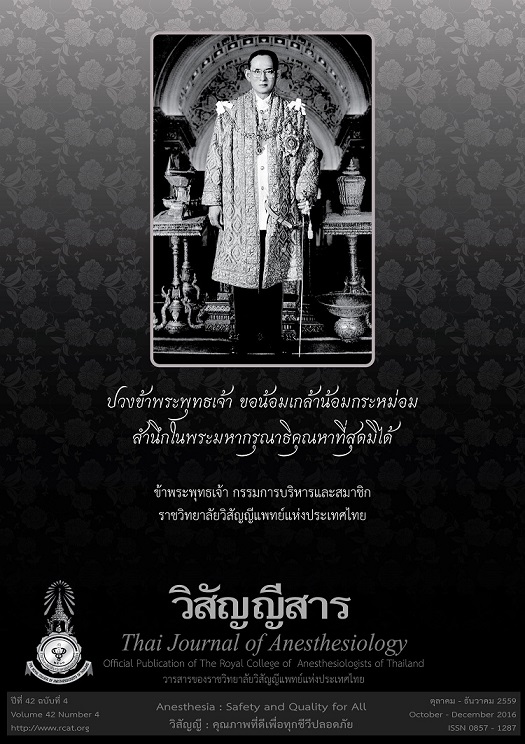Efficacy of perioperative administration of duloxetine for prevention of post-mastectomy pain syndrome
Main Article Content
Abstract
Background: Post-mastectomy pain syndrome (PMPS) is a neuropathic pain syndrome following breast surgery. It can produce severe pain and limit daily activities, resulting impairment of quality of life. Peri-operative analgesia has been shown to be efficacious in reducing post-operative pain, and may be effective in reducing the incidence of certain type
of neuropathic pain. Duloxetine, a selective serotonin and nor-epinephrine reuptake inhibitor (SNRI), has demonstrated efficacy in several chronic pain conditions such as painful diabetic neuropathy, chronic low back pain and fibromyalgia.
Objectives:The objective of this study was to evaluate the efficacy of duloxetine for prevention of PMPS and its side effects in post-mastectomy patients.
Methods: Fifty patients scheduled for modified radical mastectomy (MRM) were randomized to receive either 60 mg of duloxetine or placebo on the night before surgery then continued every morning for 7 days postoperatively. Pain was assessed at 24 hr, 48 hr, day thirtieth (D30) and day ninetieth (D90) after surgery by 11- points numeric rating scale (NRS).
Additionally, side effects of duloxetine were recordedat day seventh after the operation. Results: Compared with placebo group, duloxetine group reported no significant difference in incidence of PMPS on D90 (28%vs 40%, p = 0.37). However, dizziness and dry mouth were common side effects with significant higher rate in duloxetine group (p < 0.0001 and
p < 0.004 respectively)
Conclusion: Perioperative administration of duloxetine had no effect to prevent PMPS at three months after operation.


